‘My mom wanted to take poison, but she learned from a letter that we were alive.’ The story of a doctor from Mariupol, part 2
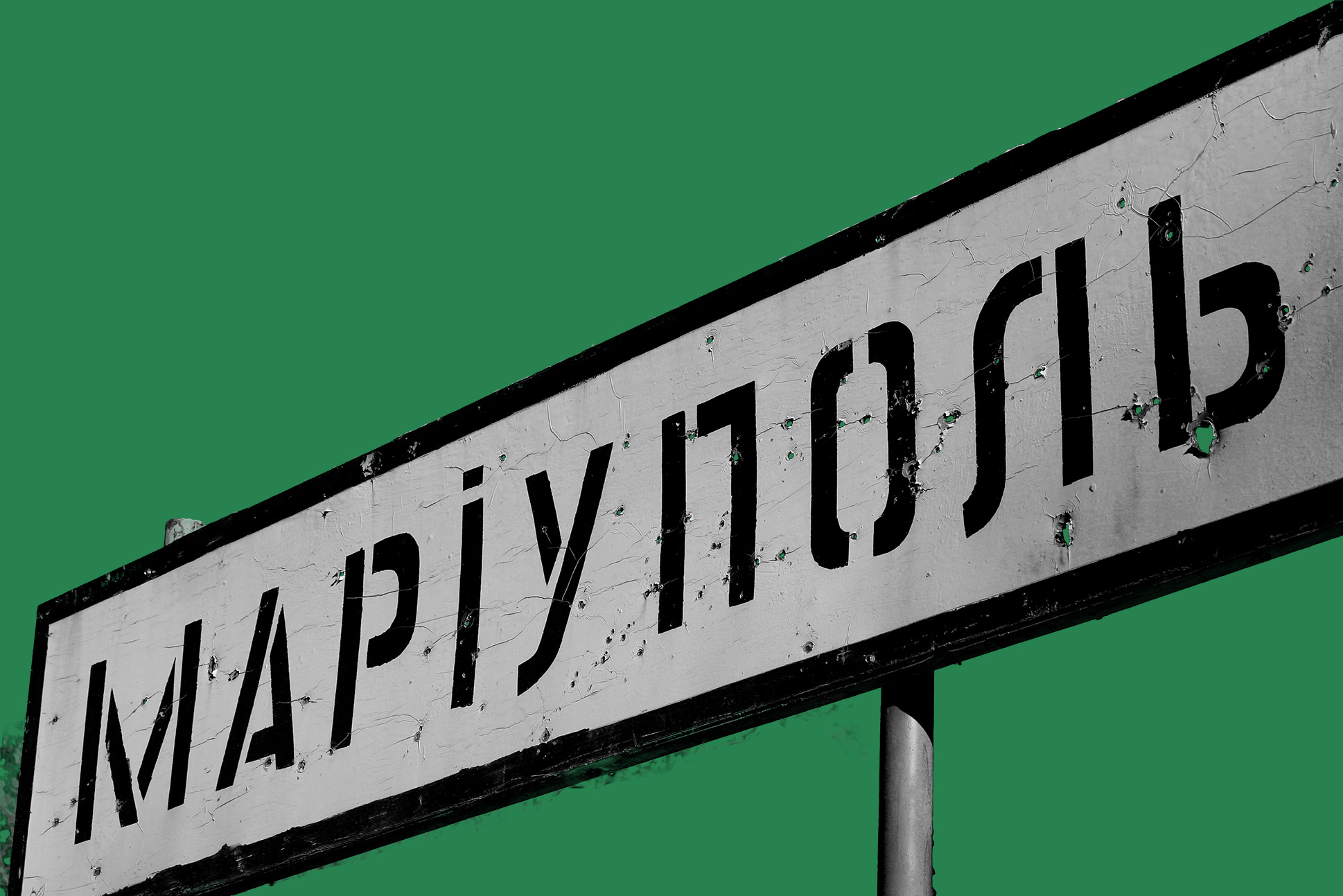
“After leaving Mariupol, we listened for 10 minutes to the birds singing and the grass rustling, and then we cried for a long time,” recalls children's doctor Hanna Shevchyk.
In the previous part she spoke about the first days of the war in Mariupol and how the Russians forced people to leave for Russia.
Yes, we were bitter and didn’t want to go. Some people wanted to leave Mariupol on foot to save themselves. I think some from our shelter later went to the Russian side. But there were also people gathering columns of cars, driving to the Ukrainian side.
On 17 March, Yegor, the boy with epilepsy, and their family said they would leave and drive through the regional hospital. We knew my mother worked there, and we handed them over a letter to her. I informed my mother in this letter that we were alive and I was pregnant. We wanted to know if everything was fine with her.
A few days later, my mother came to our shelter. I hugged her, and she said she stayed in the hospital without ever getting out. There was no light, but she performed three cesarean sections under candles and assisted women in labor. She saved 13 babies. The wounded young guys had many amputations. Also, wounded women came after the maternity and children's hospital shelling. She’s been through hell. When the Russian military arrived, they told her the Left Bank had been demolished. They said our house was no more, and my mother thought we were dead. She wanted to take poison, but the people from our shelter arrived and brought her my letter, from which she learned we were okay. They said: “You will have another grandson or granddaughter. The war will end. There will be new life.” Of course, my mother was delighted.
She came to us under shelling to hug us. We told her we’d try to get out, perhaps find a car. Then I told her we’d take her with us, but she answered: “No, I’ll stay here. I have nothing to lose.” So finally, I insisted, “No, we will pick you up. You will not stay here because it’s hell.”
My mom is so brave. She had never provided medical assistance to the Russian military. They held her at gunpoint, but she said: “Shoot me. I’ll not help. Go back to where you came from and let them sew you up there. Go to Putin, and let him stitch you up.”
My mother assisted only civilians and the Ukrainian military while they were around. She is my hero!
When the Russians arrived, they were staying at the candy factory. There was no glass there, but the building itself was standing. They began to disperse on each floor, and the snipers were “cleaning up the city,” as they said. They killed our soldiers and civilians. They told us: “Put on white bandages and go with the children for a walk. But be careful; snipers can get confused and accidentally shoot you.” Some walk!
Of course, we did not let the children out, as it was dangerous. The adults would go out to breathe a little. There were always ashes, and everything was in smoke. Everything was gray and black. Everything around was on fire. Once, on 24 March, I took my son out, as it was more or less quiet in our central area. By then, they had already smashed everything they could and occupied everything that could be occupied. I told him not to be afraid when he sees what happened to our city. The children fooled around lately and asked to go home to their toys. So, I wanted him to know why we had to hide in the shelter.
He told me earlier: “We want to watch TV. We want to live normally. How long can you keep us here? Let's go home.” I told him we had no home, but he responded: “We're going home anyway.” When we went outside, I showed him everything around us. We had such a “beautiful” view of the central ruined market with only iron rods left.
I don’t think I have seen such terrible scenes in films.
My husband and I recently watched Moonfall, where meteorites fall to the ground, and everything is torn apart. It seemed to me that these scenes were similar because everything was on fire, scorched, destroyed, and empty. There was a destroyed tank. Terrible picture for the child’s eyes. He looked at it and said: “I understand why we are in the shelter.” “Now, let’s go back down and live on.”
Car repair and evacuation
It turned out that our friend had a bus with no windows in the cargo compartment. A shell hit it, and the radiator was damaged; it burned completely. The windshield broke from the explosion, which was okay. However, the radiator must work, and we had to find a similar radiator somewhere.
We walked around the ruined market looking for a car similar to ours but with a radiator. We also looked for leashes for animals: we had with us my mother's dog and my brother's cat. The animals were also our family, and we wanted to save them.
When we entered the square with the central market and shops nearby, which was beautifully built in a European style, we found a huge gap with the size of a five-story building in the middle.
The houses also had large holes inside.
We could see neighboring streets through these holes, and this was frightening. I remember walking and feeling like I am observing myself from outside. My brain refused to believe this was happening. I thought: “Such destruction, and this is not I walking through it.” I had no emotions and was afraid to think, but I no longer feared death; just terrified of becoming crippled.
I remember this thought: “Lord, please, if a shell hits me, make it so that it immediately kills me. I don’t want to lose a leg or an arm or bleed for a long time. I don’t want to suffer. So kill me right away, in a second. Those thoughts were scary: “Would a normal person even think about this?”
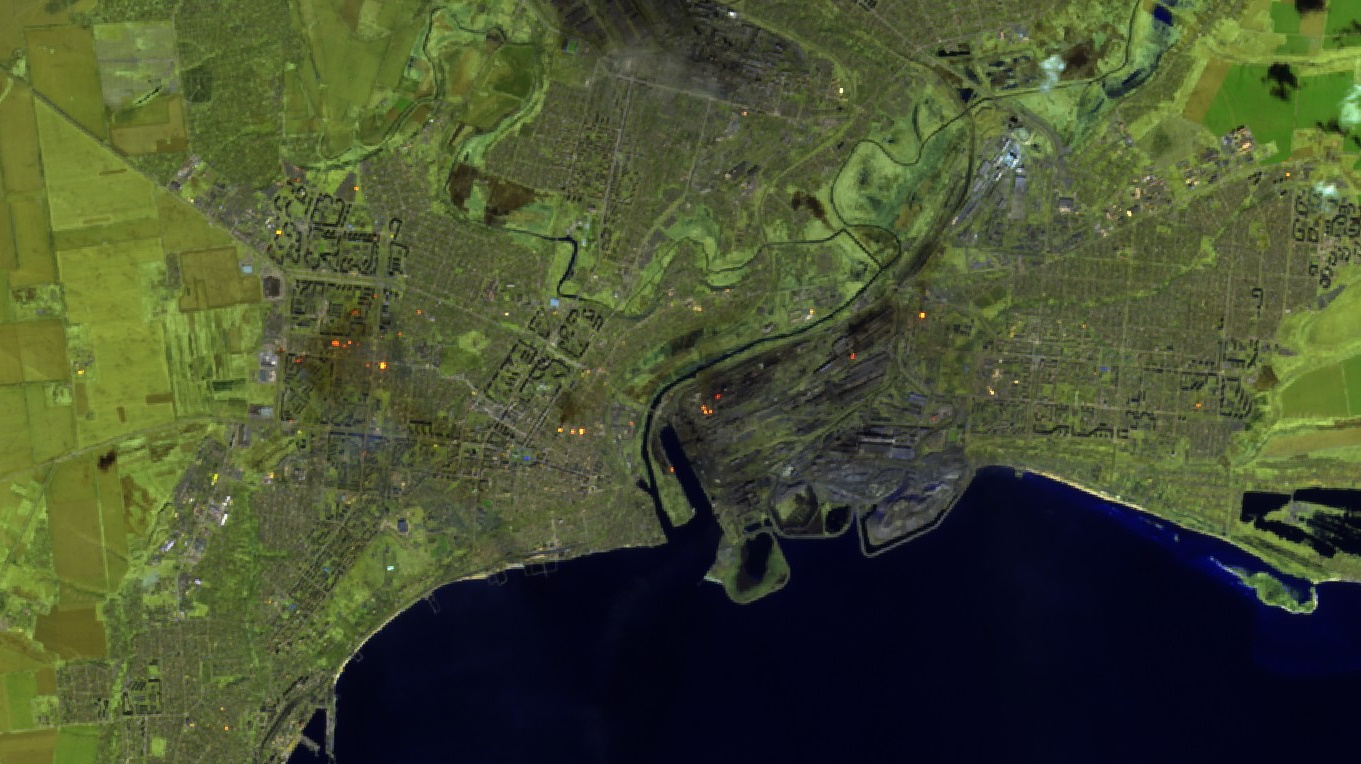
Somebody told us about a container from “Pet Products” that was more or less intact. We had to climb high to get inside. Next was another container with carpets, so we climbed into it. I got angry with people who were unrolling carpets. They spread them to look at the patterns, then looked at the next one. Can you believe it? They were grabbing carpets! I told them: “People, screw your carpets. Are you going to eat them?” However, they silently continue.
My sister-in-law’s mother lived a little further; however, we couldn’t get there. We tried several times, but the Russian military shot us in the legs, shot in the air, and shouted obscenities — like, get out of here because we will kill you. So we lost touch with her and did not know whether she was alive. We have tried to return there several times.
Finally, the guys found a radiator in the car nearby. The car was completely torn apart by a mine explosion, but the radiator was intact. So there was hope that we could fix our car and leave. We started collecting things, but we didn’t have much. Finally, we managed to pack essentials, primarily provisions.
On the 27 March, we started repairs, and on the evening of the 29th, we finally started the car. We decided to leave on 30 March: “We’ll have breakfast in the morning and will try to get out.”
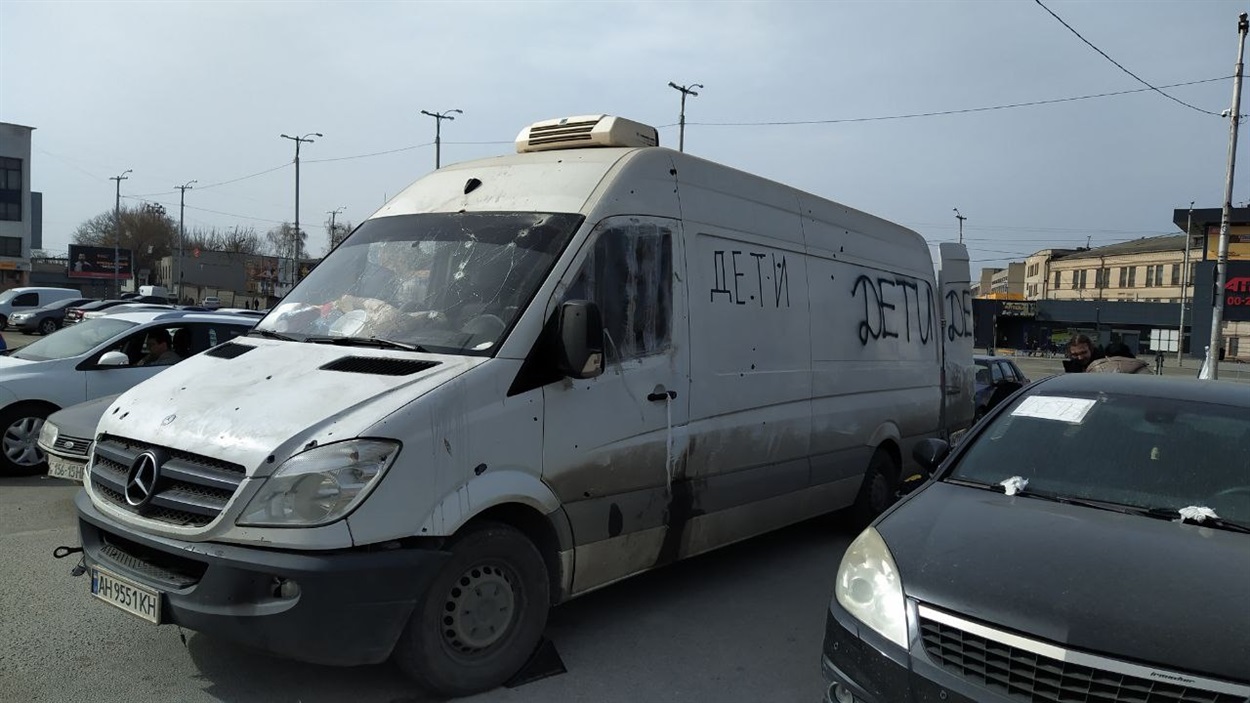
We were seven cars in a column — all people from our shelter. Each vehicle had around eight, and 23 climbed into our bus cargo compartment. In front, next to the driver, were my sister-in-law Vika with her son and another lady with a child. We thought that if the Russians saw women and children, they would not blow up the bus. But, on the other hand, we were apprehensive that our bus was of a cargo type, and they would think we were transporting military personnel or weapons. So we decided to have the bus in the middle of our seven cars column.
We agreed on a signal for communication between the cars. Nobody gets out of the vehicle if we stop until the driver opens the doors. We used children's walkie-talkies for communication between the driver’s cabin and our cargo compartment.
Ten minutes after we left, we stopped. I used a walkie-talkie: “Hello, hello, Vika, what is it?” She was silent. We stood for about 5 minutes, and then she responded: “Our drive belt broke” Our bus couldn’t go further, and we were already approaching the city’s outskirts and the first checkpoint. There was fighting and shooting all around. The rest of the cars have already left.
We didn’t know what to do; we had many people in our car and were scared. So we began to search the shops and around destroyed buildings for belt replacement. It all took us two hours, but we got lucky. We ran into a man who said: “There are containers that may have what you need”. So a few people ran there, and I stayed with the children. Finally, they returned with a bunch of belts, and the driver found one that fit our car. Then, we saw other vehicles from our column and exhaled with relief.
We started driving again but stopped after five minutes. It turned out the clutch broke. How much more can we take? We all were praying to God to start moving, hoping a guardian angel would take us somewhere from this city.
Again, by chance, we met a man, a former auto mechanic with a stroller filled with car parts he had looted somewhere. He offered his help: “Let me see what happened to your car.” He told us our car could only go in second gear. I am not a car driver, and I don’t understand what this means, but I knew our driver was uncomfortable. However, he could start the car, and we drove off in second gear to the hospital where my mother worked.
We picked her up along with a bedridden older man. He was a friend and died on the road, but we were able to bury him in Lviv. The road was difficult, but in the end, we managed to bury him with dignity.
“Either delete it, or I will take away the phone”
The Russians stopped us at the first checkpoint. I heard our girlfriend crying and asked: “What happened?” The Russians took away their car, and eight people had no transport. Everyone panicked, but how could we leave our own? So we began to spread them around other vehicles. We were concerned with an overload of people, but we knew this was the only way out. We had a cargo container where people could stand or sit sideways. Accordingly, each car accommodated another person, and the bus took the rest.
These bastards, these Orcs [Russian invaders], checked all men. They did not touch the women. They only looked at us. The men’s documents were reviewed, and their phones were checked. God forbid someone had something on their phone — they immediately took it away. My husband had one photo of our broken house. They said: “What is it?” He replied: “This is my apartment.” “Either delete it, or I will take away the phone,” he threatened. So my husband removed the picture, and now we have no photographs of our house.
We arrived at Manhush and stopped to look for a place to spend the night. Because the curfew was approaching, we understood that we could not go at night. So we started asking the locals, and they suggested a kindergarten. My brother and his wife went there, but it turned out that people there were sitting on the street benches. We had many children, women, and a bedridden older man, and it was not an option for us to stay on the street. So we began looking for acquaintances, someone who could shelter us all for a day.
I am not a big fan of bread, but now I love it and think that the most important things in life are silence, water, and bread.
We found a bread stand. I remember we rejoiced like children: we did not see bread for a very long time as there were no shops. We were standing looking like savages. People walked by, and we addressed them: “People, look, it is clean!” We didn’t bathe for a month and a half. I went to the kiosk and was happy to pay with money: we didn’t need money in Mariupol. We used cigarettes as currency. One could exchange wet wipes and a disinfectant solution for them or anything else. Some people were ready to sell their homeland for cigarettes. Nobody needed money in Mariupol; you could throw it into a toilet or burn it.
Manhush is the DPR (Donetsk People’s Republic), a territory controlled by Russia. However, they had bread and rolls in the store, and we bought them for the children and ourselves. I noticed a bag with jam rugelach behind the counter, and I asked if we could bye them. The shop clerk said we couldn’t because she did not know the price. “I'll put them up for sale tomorrow.” I was upset. We had the money but couldn’t buy the sweets, and my husband offered to negotiate with her. He said: “Will you sell us the rugelach if I give 100 hryvnias? They don't cost that much.” She said: “Okay”, and in the end, she gave us the rugelach for free. I laughed later and said: “Probably, we look terrible, so she decided to give them to us for free.”
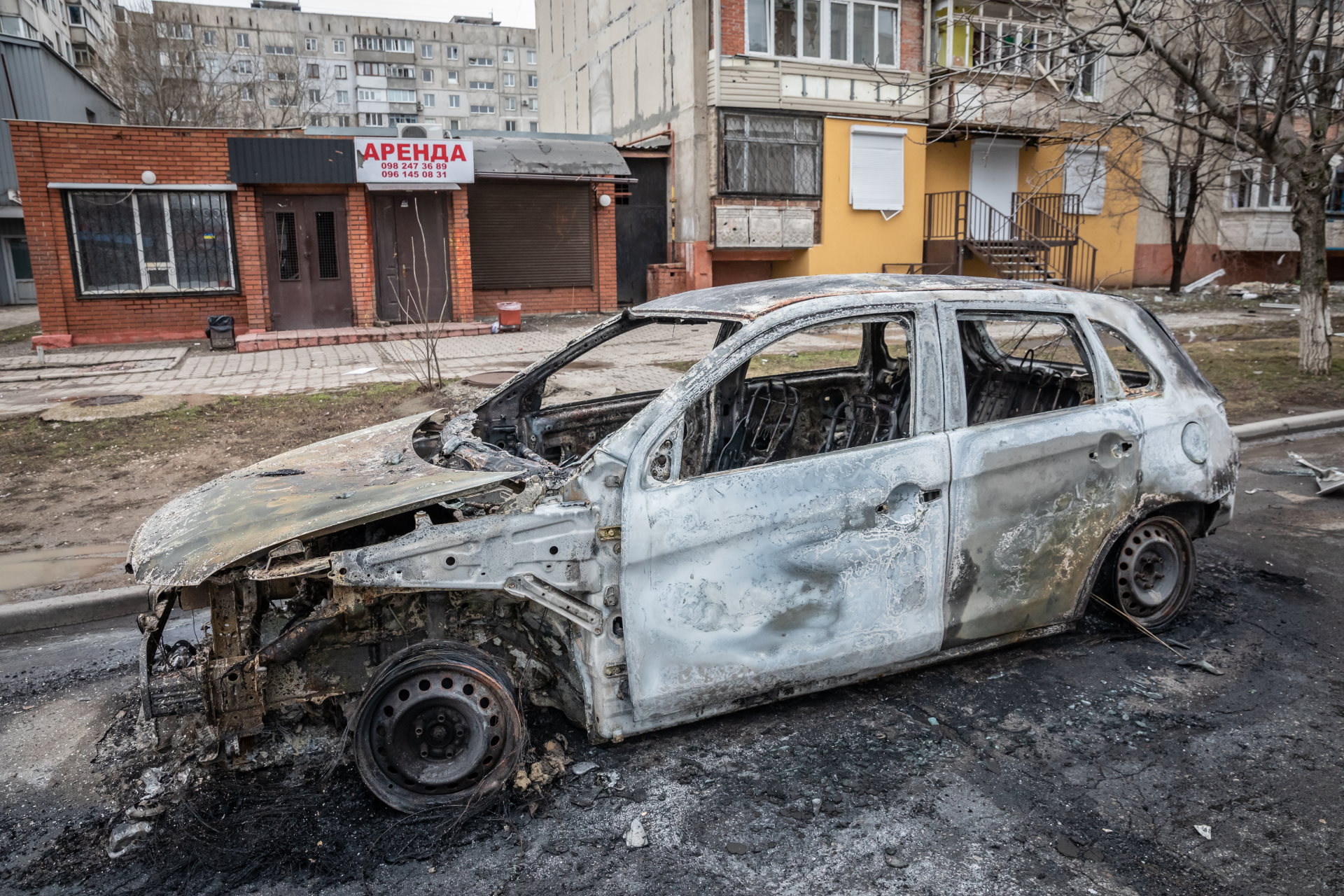
People from our group found friends who had an empty room in the house. We could lie on the floor there. We were delighted and began to think about the next day and what we would do. We were standing by our cars when local people stopped and told us we could not leave Manhush for Ukrainian territory. They said the Ukrainian troops would immediately mobilize men from our group. The women would continue on foot, and the men would be taken away to fight. They said we should travel to Russian territory.
In truth, we didn’t mind our men fighting, and they didn’t mind either, but after passing hell, we were looking for safety, peace, and silence for a while. Some people know how to hold weapons properly and are trained in military tactics. It was unclear why they would use our guys like cannon fodder. It was utter nonsense. We didn’t know who to trust and weren’t sure if we could leave.
His name is Maxim
By chance, the Lord sent us a volunteer. His name was Maxim, and many people knew him in Mariupol because he helped many to safety. He and another guy, I think Alexey, were volunteers. They bought cars and food with their own money and took people out. He came up to us and asked where we were from. We answered: “Mariupol.” He said: “Tomorrow I will take the children and the elderly in my car. You can follow me, and I will lead you to Ukrainian territory.” We asked: “Where does it begin?” — “After Orikhiv, Zaporizhzhia highway begins. Zaporizhzhia is already in Ukraine. You will be fine. They will feed you there and take care of you.” He told us that the army in Ukraine doesn't draft men immediately. He told us the latest news. Mariupol was surrounded, and nobody could get into it. He told us to gather at the kindergarten at 10 am, and we would start from there.
We began to discuss this situation with the drivers of the other cars. It turned out that only our bus wanted to leave for Ukraine. Everyone else was scared. They thought they would be shot or taken away. “It’s impossible to get through. Now it's safe here, so we will stay in Manhush and decide what to do next.”
Only the group in our bus wanted to reach Ukrainian territory, see the Ukrainian military, and hug them. We wanted to kiss the Ukrainian land.
We did just that. We spent the night in Manhush. Then, in the morning, we got ready, boarded our bus, and followed the volunteer, Maxim. We drove a kilometer, and Maxim suggested that my mother, son, and I move to his car. I didn’t feel good on the bus as it had no windows and was swaying, which in my condition, made me feel sick.
The rest of the group remained on the bus. We kept getting separated, going through many checkpoints, and this made us very nervous.
From Manhush to Zaporizhzhia , we counted 25 checkpoints. Some were 10 meters apart.
They stop you and take all the men out of the cars or buses. They examine people: passports, torsos, arms, legs, phones, and everything else. Sometimes, you see another checkpoint in the distance, and the same happens again there. It was such an incredible torture. You think: “What the hell! You checked us; can’t you pass a message to the next checkpoint?” But, no, It was necessary to humiliate us at every checkpoint.
They also tried to trick us. They said: “Glory to Ukraine,” and, of course, we all wanted to say: “Glory to the Heroes!” They watched people and aimed guns at us: “Try to say it! It will be fun.” Some said: “Glory to Ukraine. Glory to the goats.”
Mostly young guys, jerks, stood at checkpoints. In budennovka, they had belt buckles with sickle and a hammer. All this infuriated me, and Maxim, a volunteer, constantly gagged me so I would not say anything. Finally, I said: “You don’t understand at all what the symbols on your belt mean.” Their machine gun made them feel big, and they humiliated our men.
It was all so disgusting. At some point, we were significantly separated from our bus. It happened because Maxim said: “We can’t wait here.” We almost reached Orikhiv, and there was constant fighting, so we needed to pass quickly. There was no mobile connection, and we thought the bus was far behind. They didn't know that they couldn't stop and needed to move carefully because the mines.
Mom and I were nervous. Finally, we came to Orikhiv, and a connection appeared there. I tried to call someone to ask where they were, but they did not respond. My mom got hysterical and started crying. She said: “I feel something happened to them.”
Finally, my phone rang, I responded, and Vika told me that a shell exploded five meters from them, and a rocket almost hit my husband. Thank God he managed to duck down in time and was saved. They stopped to refuel. It was a close call, literally a few meters, and they would all be dead. I told Vika not to say anything to my mother.
I told my mom: “Everything is fine; they are alive and following us. They just fell behind.” I was shaking myself from the thought we could’ve lost them all. There was such tension while we drove, but we all survived.
When we finally arrived in Zopirizhzhia, it was beyond words. First, we hugged the military, and they brought pies to the children on the bus. We hadn’t seen pies for a long time, and it was very touching that the soldiers were distributing their rations.
They started talking to us, but we still were scared. They teased and laughed, and we no longer felt such tension as at the Russian checkpoints. Ukrainian was: “Hello, drive through! You are ours, and we are waiting for you.” We just adored them. When we saw them, we thanked them for protecting us and being there.
We tried to say many words, but it was impossible to convey our feelings. Then we reached Zaporizhzhia. They usually bring you to the Epicenter and the Metro. Many volunteer organizations work there. They feed you, and you can take some clothes. We didn't take anything, as we still were unsure of ourselves. The main thing for us was that we arrived. We ate there, and they took us to a kindergarten. We slept in small beds with tiny pillows, but the linen was fresh, and we felt so good.
We realized what a person needs most in life. It doesn’t matter what kind of ceiling you have — matte or glossy, furniture or wallpaper. The most important thing was that we were on our territory, surrounded by people who think like us, and we were safe.
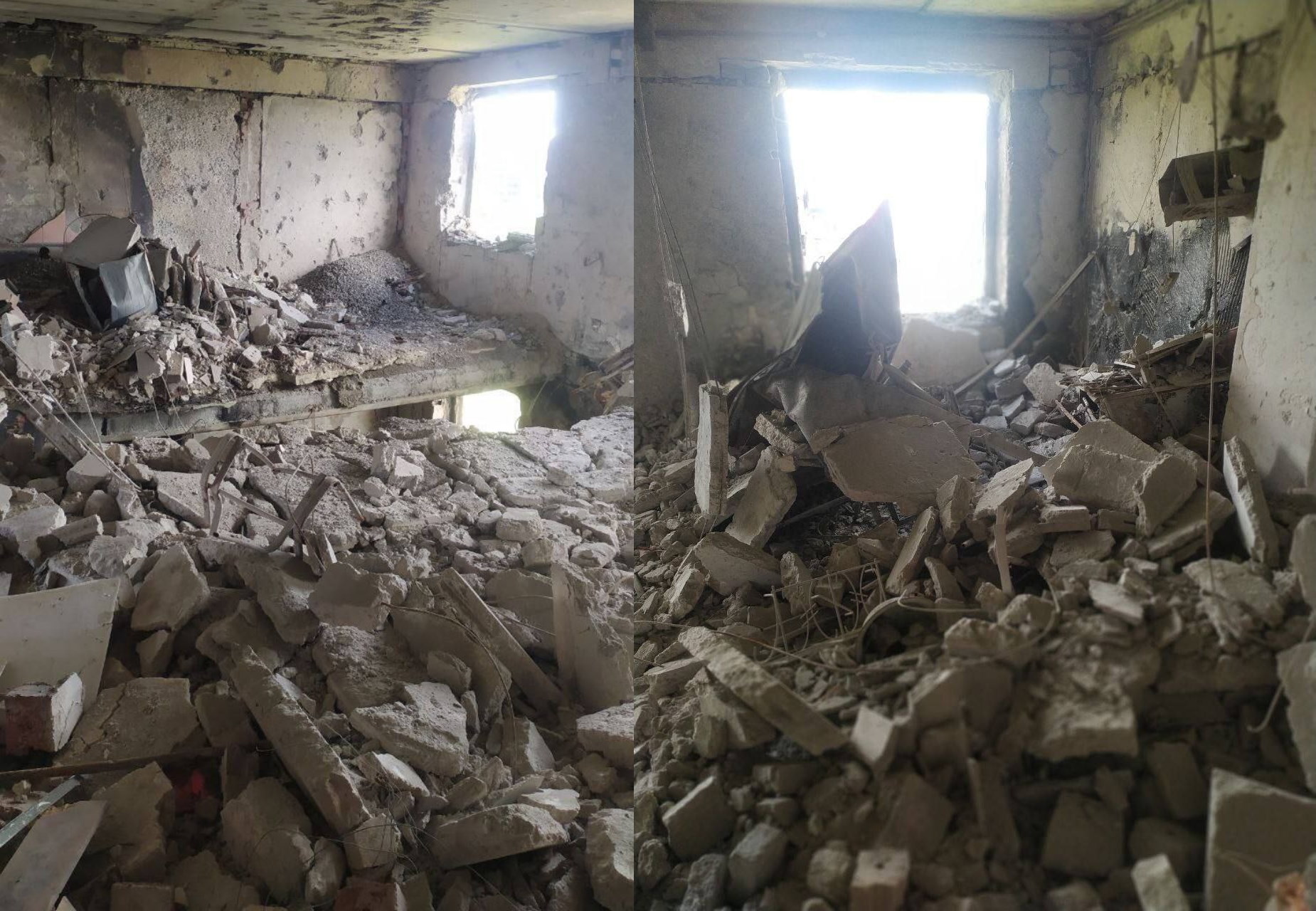
Eventually, we decided that we needed to move on. My grandparents died a year ago in the Vinnitsa region. They lived in the village of Bukatinka, located across the river from Transnistria, Moldova. We decided we would go there, as it's quiet and calm, surrounded by forest and mountains. We’ll rest there for a while and then decide what to do next.
We boarded a humanitarian train from Zaporishshia to Lviv. We got off the train in Zhmerynka. From Zhmerynka, we went to Mohyliv-Podilskyi, and from there, we went to the village of Mervintsy. They gave us a house there.
I remember the first emotion when they let us out of the cars and said: “Here is your home, don’t worry, there is water here, gas and light, and the Internet. Stay here, and goodbye.” We were 18 people. The grandfather did not survive the road, and his son and daughter-in-law went to Lviv for burial. That’s why there were fewer of us left.
The first thing everyone said at that moment was: “Do you hear the birds singing?” So we stood for about 10 minutes and listened to the birds singing and the grass rustling. And then we hugged each other and cried for a long time.
I have never seen my brother crying. He is a big two-meter man. All those emotions we kept in ourselves were finally spilling out. And we were just glad that we were safe. We were alive and not even injured. Everyone was able to go where they wanted. We stayed there for two weeks, and then, by chance, my husband was offered a job in Truskavets. So we packed our things and went there. I also found a job in Boryslav, and it’s only 20 minutes away.
I work now as a doctor in a maternity hospital, which is small, and there is little work. So I'm resting, you might say. We arranged for my son to attend school number 1 in Truskavets. Yesterday, he said a nuclear bomb should be directed at Putin to kill him because the war ruined his childhood, and he missed so much school. He is intelligent but had to go to first grade again.
He and I cried together, and he said: “Mom, you know, there is a game of chess with many pieces on the chessboard: queen, rook, knight, bishop, and the main piece is the king. And to win in chess, to put checkmate, you need to kill the king. Mom, why am I saying this? We need to kill Putin, and then the war will end!”
And so I wish Ukraine to see it all happening. To see this monster and his administration perish so that we have peace again and nobody else experiences this hell.
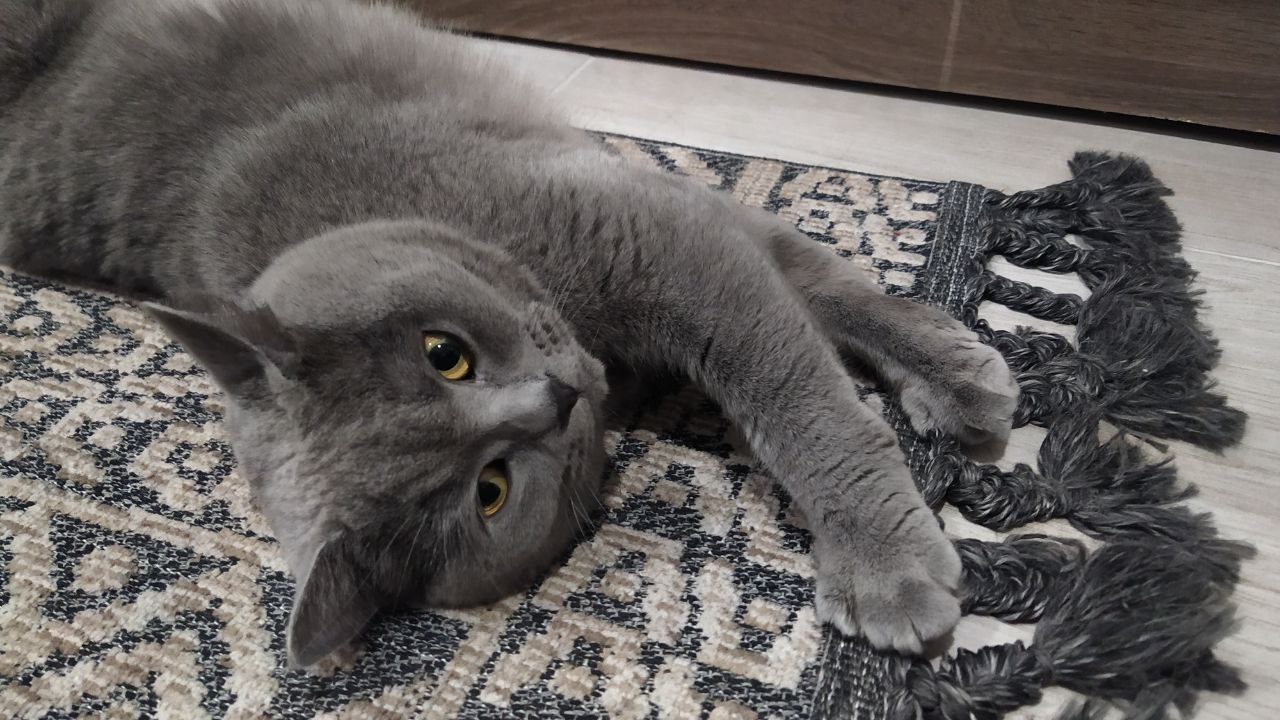
Denys Volokha: I have another question. Do you know people who agreed to go to Russia? What have they been through, how was it done, and where are they now?
Hanna Shevchyk: I know some.
We were on Ukrainian territory when filtration camps began. Russia had completely taken control of the roads, and the people were not allowed to enter Ukrainian territory. They took fingerprints, pictures, and data. They checked social networks and work activities, and everything else. God forbid you are a journalist, a policeman, or an activist.
They forced people to go to the village of Bezimenne, where the filtering took place. People lived there in inhumane conditions. There were no beds, no mattresses, and people slept on a concrete floor. They had to live like this from a week to a month. There was no food, and water was given once a day. They bullied people as much as they could.
My sister-in-law has a mother whom we tried but could not pick up. Recently we managed to get in touch with her. It turned out she was hiding in the house’s basement. They could not get out of there because there were active hostilities around. They contacted us 2.5 weeks ago (the interview was recorded on 5 May - D.V.)
When she passed the filtration, we were glad she was alive. At that moment, it didn't matter where she was going. She is a Russian citizen herself. She moved to live in Mariupol back in the 90s because she got married. She raised two children in Mariupol, but her relatives are in Rostov.
They put them on a train and said they were going to Russia. She thought they would be taken to Rostov, but it didn’t work out that way. They ended up in Khabarovsk Territory. The trip was long, and they traveled in closed wagons. Officials told them they would raise the economy of the Russian state, and they worked there like slaves. This is one example.
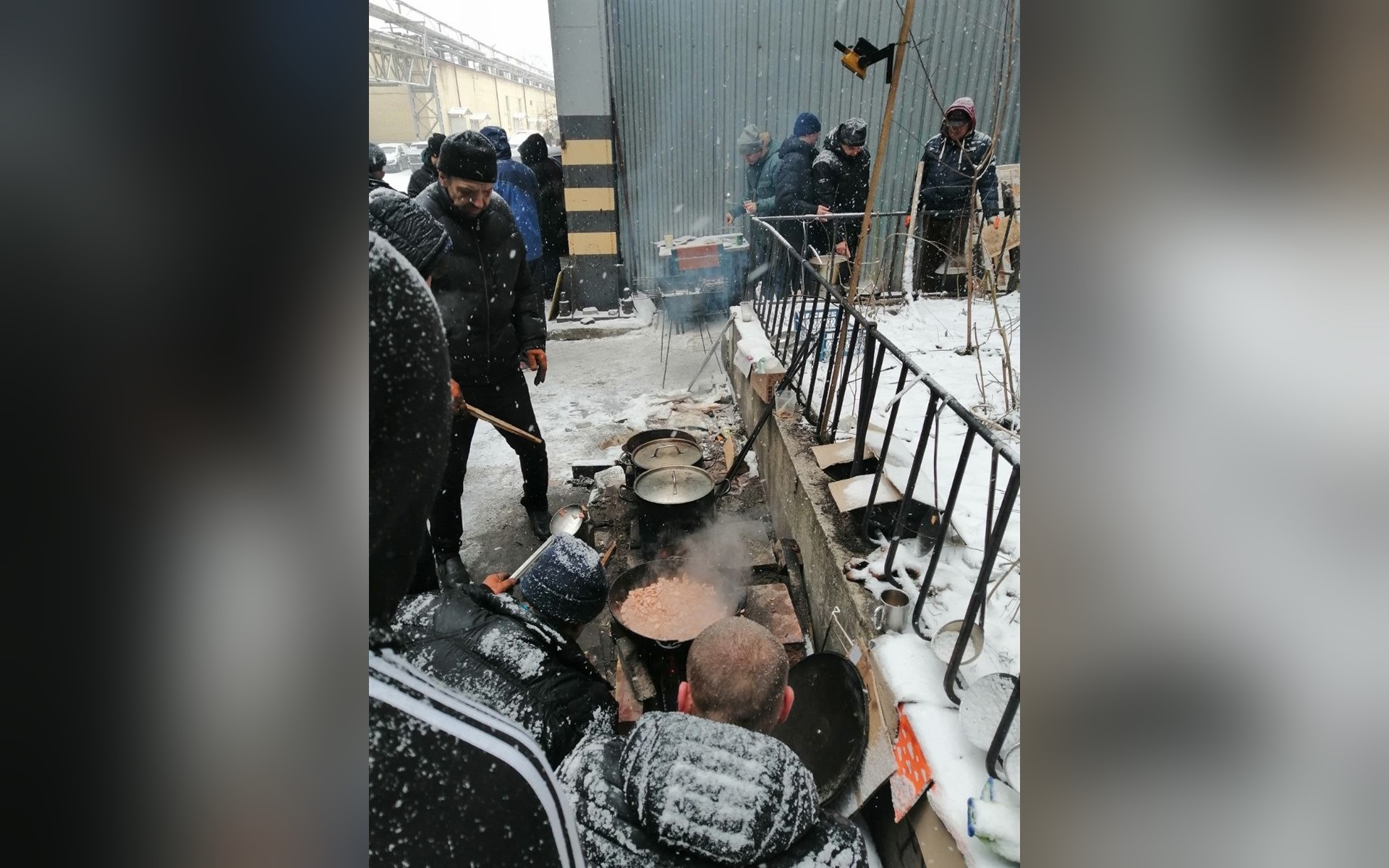
Also, several nurses, who remained in my maternity hospital, traveled from the filtration camp by bus to Rostov, and from there, they left for Krasnodar and Voronezh.
I know one person, my nurse's aunt, the only one who said that her family was promised some monthly compensation: a thousand and something rubles, plus additional money for lost property. She also claimed they would receive a loan for housing with a small percentage. She said it was good in Russia, just excellent! “We will buy an apartment here, but they don’t give anything in Ukraine. We were penniless in Ukraine, but here we will finally live.” As far as I know, our nurse lost contact with her. She told her ant:“I won’t communicate with you at all. You’ve gone crazy.” Most of the people were forced to leave Mariupol for Russia. They would be happy to go to Ukraine but do not know how to do it. Often after a forcible move to Russia, they go abroad.
My doctor went to Georgia, then Lithuania, and now she is in Germany. So many Ukrainians scattered all over the Earth. I don't want to leave Ukraine. I think many people would like to return but don’t know how. Nobody writes about it in the media.
My mother's goddaughter and her best friend Natasha are now in Mariupol, living in the basement in the city's central district. They are afraid to leave their property and fall victim to robbers. Very few apartments are left intact in the city, and the Russians break into them and take all goods.
I have a friend who volunteers at a large charitable foundation — Natalia Dedova. A shell killed her husband in the apartment, and they could not bury him. And now the neighbors said that the Orcs broke into her flat, removed his corpse, and took everything. They are freaks!
People are afraid to leave their homes, but I wouldn't be able to spend another day there. I don’t know how it is possible to see everything destroyed, burned down, and raise a child without food, water, or light. However, some people choose to stay.
My stepfather also stayed, and for a long time, I could not get in touch with him. I found a video recently where he warms up food and water on a fire. He said: “Yes, I am hiding here and not going anywhere. I’m alive and fine.” I think many would like to reach the Ukrainian territory. However, every family has its black sheep: some are happy with the “Russian world.” (Russian world is the concept of social totality associated with Russian culture). You can find such people everywhere.
Denys Volokha: Do you know people who died or were injured due to military actions? People who were shut down or whose property was taken away.
Hanna Shevchyk: We have a neighbor on the 8th floor. She just climbed out the window to see what was happening, and the sniper shot her in the head
Another is our landlady. We recently contacted them and spoke with her son. He said they were now in Russia, and she was in critical condition. Their house was destroyed, and they fled to the neighbors, but a sniper put a bullet through her stomach. Also, my nurse's son was killed by a shell, and another nurse's son and husband were killed.
A former teacher in my son’s kindergarten lived in our apartment building. She was there with her son, husband, brother, and father. After we left, we learned from neighbors that her brother was killed, and her father was severely wounded. He is in the regional hospital in intensive care. They were shelled while cooking food on fire outside the house.
I know these cases firsthand, but I’ve heard about many more. My mother saw a lot of deaths. When we took her from the regional hospital, there were many corpses. People were lying all over the place, and many burials were everywhere.
People were buried in the yards, between the buildings. Our neighbor's house burned down, and people made a large hole in its place, using it as a burial ground. They buried all residents of that house and put up a sign: “Residents of house No. 56.”





